Report on Sophia University’s UN Weeks October 2024
The 22nd Sophia University United Nations Weeks October, 2024 was held from June 8 to 24 under the concept of “Thinking about the world and our future through the work of the United Nations.” A total of eight diverse programs were developed.
Advanced Chemical Technologies Contributing to the SDGs
On October 8, a lecture on “Advanced Chemical Technologies Contributing to the SDGs” was held jointly with the Faculty of Science and Technology. The event was organized by Professors Noriyuki Suzuki and Kazuo Takahashi of the Department of Materials and Life Sciences, as an opportunity to explore how chemical technology can contribute to the goals achieved (SDGs) in order to maintain sustainable development of humanity. Guests included Dr. Koutaro Hashimoto (Honda R&D Co., Ltd.), who is involved in the development of carbon-neutral automobile and aircraft fuels that do not increase carbon dioxide emissions, and Professor Jun Fukuoka (Hokkaido University), who researches catalyst technologies that contribute to the long-term preservation of fresh food.
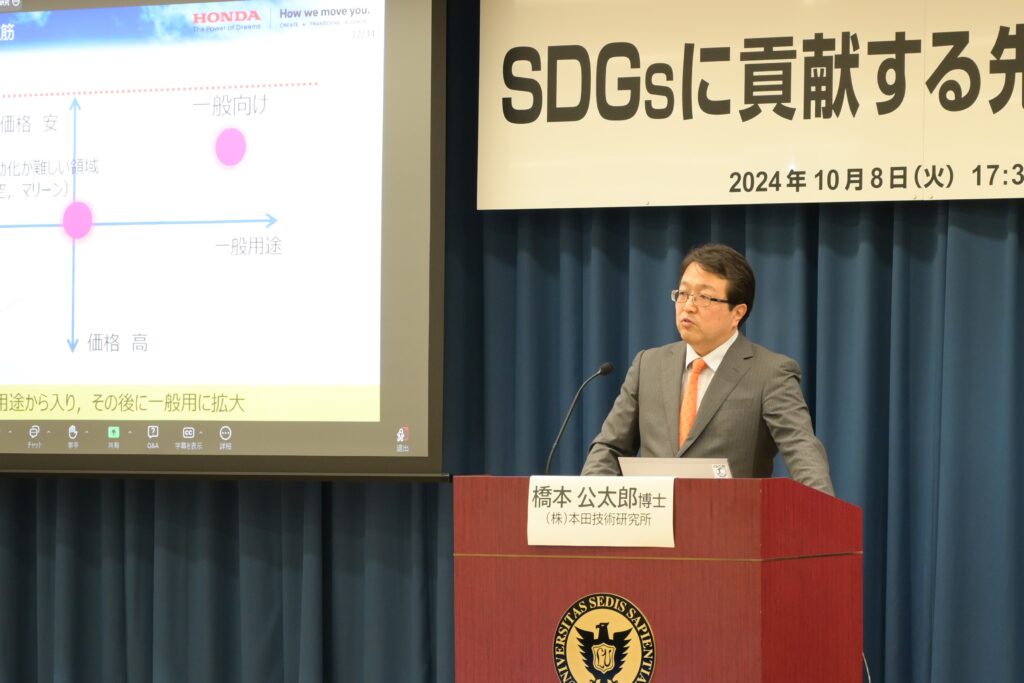
First, Dr. Hashimoto gave a lecture titled “Honda’s Carbon-Neutral Fuel Technology, Accelerating in Motorsports and Flapping in the Air with Jets. After explaining international trends in greenhouse gas emission reduction activities, such as the lack of alignment among countries in setting targets to achieve the “2050 Net Zero Target,” Dr. Hashimoto explained Honda’s efforts to go carbon neutral with fuels. He then explained Honda’s efforts to go carbon neutral. “Honda is promoting research and development with a multi-pathway approach (i.e., preparing a variety of options) to go carbon neutral. Among them, we will work on carbon-neutral fuel with the aim of utilizing it in F1 racing, which we will re-enter in 2026, and in the aircraft business, for which demand has been growing in recent years,” he said enthusiastically.
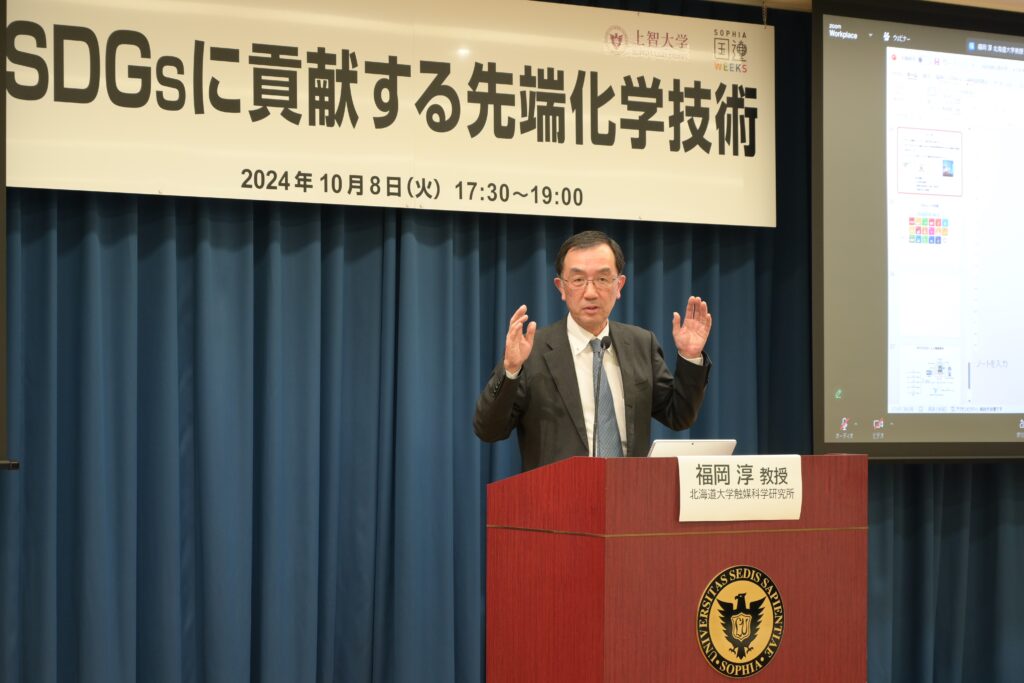
Next, Professor Fukuoka gave a lecture titled “Catalyst Technology Contributing to Food Loss Reduction. He pointed out that the amount of household food loss has not been decreasing in Japan, and explained the process of numerous experiments he conducted to utilize catalyst technology, his area of expertise, for keeping freshness of fruits and vegetables, along with charts and graphs. He introduced how the results of his research were eventually returned to society, using examples such as home refrigerators and corporate storage facilities, and stated, “Reducing food loss is also a shortcut to combating global warming. We would like to continue to promote the use of environmentally friendly platinum catalysts through joint projects with companies,” he said, expressing his hopes for the technology.
After the lecture, more than 150 audience and online participants asked various questions about the applicability to other fields and the possibility of cost reduction, showing the high level of interest in the topic. The event ended on a high note.
Reconstruction and Peacebuilding for Gaza
On October 15, we invited Abdallah Al Dardari, UN Assistant Secretary-General for Arab Affairs at UNDP (United Nations Development Programme) New York Headquarters and head of reconstruction in Gaza, to give an online lecture on peace and reconstruction in the region.
At the beginning of the lecture, Professor Daisaku Higashi of the Center for Global Education and Discovery, who served as moderator and supervisor, explained the war situation in the Gaza Strip and the purpose of holding this lecture. This was followed by opening remarks by Sali Augustine, Chancellor of Sophia School Corporation.
This was followed by a three-part lecture by UN Assistant Secretary General Dardari. The first part was on the impact of the conflict in Lebanon on the regional economy. It was reported that the conflict is not only causing immeasurable damage to the Lebanese economy, but is also having a negative impact on the economies of neighboring countries such as Saudi Arabia and Qatar, as well as neighboring Syria, due to the movement of refugees, reduced Suez Canal shipping, and decreased direct investment from abroad. Mr. Dardari said that the economic situation in these regions has been very difficult for the government of Syria. Mr. Dardari said that the starting point for discussion was to consider the reconstruction of these regions as a whole.
In the second part of the presentation, Mr. Dardari presented estimates of Palestine’s economic recovery in 10 years in each pattern under three different assumptions: no early recovery, limited early recovery, and unlimited early recovery. In these simulations, Mr. Dardari stated that in order for Palestine to recover to its 2022 GDP in 10 years, $280 million in development assistance would be required in addition to $280 million in annual humanitarian assistance.
In the third part of the session, a report was given on UNDP’s actual assistance in the bombed-out Gaza Strip, where UNDP teams were informed of community-based activities such as garbage disposal, debris management, UXO removal, small business support, and school reconstruction, pending a cease-fire.
At the end of his speech, Mr. Dardari emphasized that all reconstruction plans can only be implemented if a ceasefire is achieved, and that a ceasefire is necessary anyway. He also called for support from the international community, including Japan, as all of us need to be involved so that the citizens of both Israel and Palestine can have hope for the future. During the Q&A session that followed, online participants, including four students, asked questions on such topics as “sustainable support,” “education,” “peacebuilding,” “governance,” and “what Japan can do to help,” leading to a lively discussion.
War Crimes and Human Rights Protection
On October 17, a symposium entitled “War Crimes and Human Rights Protection” was held jointly with Human Resources Center for International Cooperation, with 150 participants online and 25 in-person. The symposium aimed to discuss together what is needed in the international community to deal with the various human rights violations and violations of international humanitarian law, including war crimes, that have occurred in recent years in the context of regional conflicts and civil wars. The moderator was Professor Yasuhiro Ueki, Director, Human Resources Center for International Cooperation, Sophia University.
At the beginning of the session, Kuniko Ozaki (Faculty of Law, Chuo University, former judge of the International Criminal Court) gave a keynote speech, explaining the characteristics of human rights violations in armed conflict and other emergencies, the role of international organizations, and the activities of the International Criminal Court. Next, Mr. Dimiter Chalev, Director of the Rule of Law Department, Office of the United Nations High Commissioner for Human Rights, took the podium online from Geneva, Switzerland, introducing the serious situation in recent years, in which many civilians have been killed, and stating that armed conflicts are conducted under conditions of impunity, and that UN member states and international organizations He emphasized the need for UN member states and international organizations to show that armed conflicts are conducted under conditions of impunity and that this is unacceptable.
Next, Mr. Yota Negishi (Professor, Faculty of Law, Seinan Gakuin University) took the podium to speak on “Human Rights Guarantees in War: Between Crisis and Normalcy,” explaining two perspectives on crisis: legal guarantees for vulnerable populations in war and compliance with human rights guarantee obligations in war. The lecture was concluded with a presentation by Shizuo Kanno. The lecture was concluded by Ms. Shiori Kanno, President of the International Humanitarian Platform, on “Japan and the Genocide Convention,” who introduced the Japanese government’s response to the Genocide Convention, to which Japan has not acceded despite longstanding requests from the international community.
The second half of the symposium was a panel discussion, during which Professor Ueki asked a variety of questions to the speakers, as well as to the audience and online participants. The panelists shared their concerns and anxieties about the global crisis, and discussed how the international community should deal with this worrisome situation.
Addressing initiatives among local governments and the private sector to cope with climate change: Exploring inter-linkages with regional development and local agenda
On October 18, a symposium was held to promote understanding of the current state of globally induced climate change and the advanced decarbonization efforts and renewable energy deployment of local governments and businesses. Mr. Mei Maruyama of the United Nations University’s Institute for Advanced Studies on Sustainability served as general moderator.
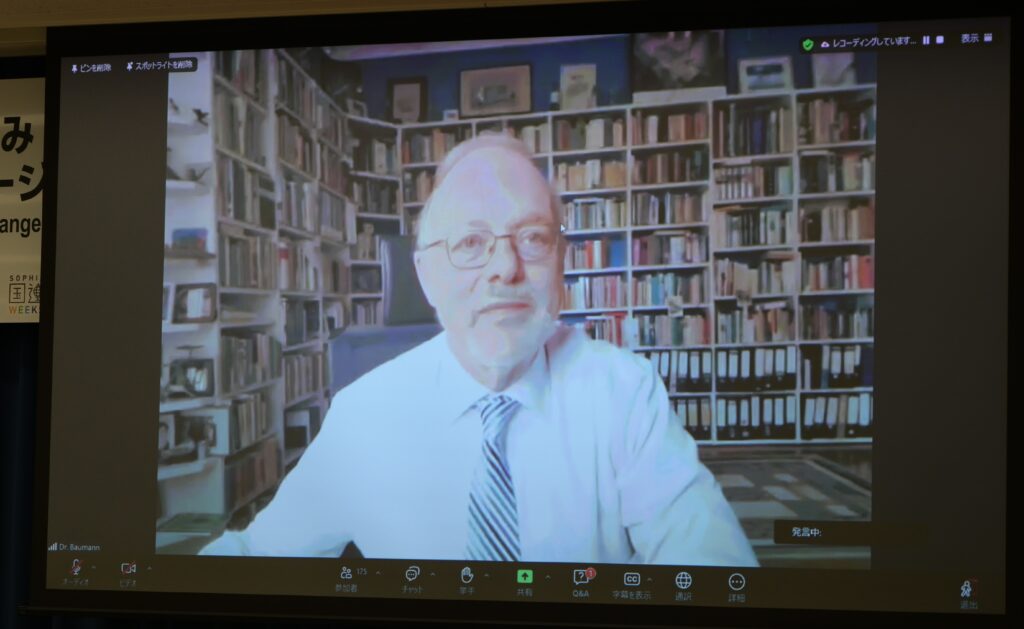
Dr. Franz Baumann, President of the Academic Council of the United Nations System (ACUNS), took the stage online for the keynote address, introducing the current state of the world’s worsening climate change with photos. He sounded the alarm about the challenge of global climate change, saying, “It is important for each of us to take responsibility for the future of our planet, based on a deep understanding of its causes and consequences.
The symposium provided a valuable opportunity for private companies, local governments, and academic institutions to exchange views on decarbonization efforts and the introduction of renewable energy from their respective perspectives. The symposium closed on a high note with Professor Suzuki concluding, “The collaboration of these sections and the fusion of their knowledge will lead to new creativity and provide an opportunity to solve global-scale issues.
Career Workshops on International Organizations and Cooperation
On October 21, a career workshop was held for those seeking careers in international organizations and the international cooperation field. At the beginning of the workshop, the moderator, Professor Yasuhiro Ueki, Director of Human Resources Center for International Cooperation, Sophia University, introduced today’s speakers.
In his keynote speech, Mr. Reiki Ito, UNHCR Representative in Japan, introduced the appeal of working for an international organization, touching on his career and the work of the UNHCR. Mr. Ito encouraged participants who aspire to work in the field of international cooperation by explaining that “it is important to analyze things from multiple perspectives in a world where there are no right answers, and to act based on one’s own ethical standards, sometimes taking risks to determine the true nature of the situation. He encouraged the participants to become active in the field of international cooperation.
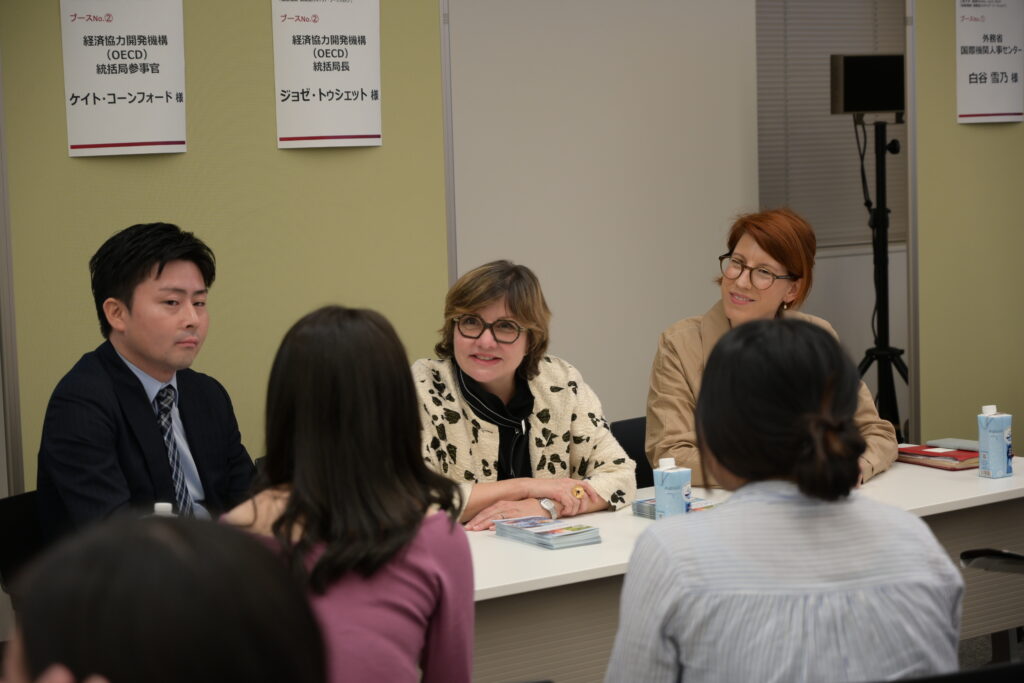
In the latter half of the workshop, in addition to Mr. Ito, members of Human Resources Center for International Cooperation, Sophia University and others participated. At each booth, students and high school students were eager to hear about career counseling and the appeal of work.
World Heritage: Towards more peaceful and sustainable societies
On October 23, a symposium entitled “World Heritage: Towards more peaceful and sustainable societies” was held in collaboration with the Pale Bleu Dot (PBD) Foundation, with 74 online and 24 in-person participants. The symposium aimed to explore how World Heritage sites, which are the common property of humankind and have irreplaceable historical value and spectacular beauty, can contribute to world peace, mutual understanding, sustainable development, and the promotion of environmental conservation.
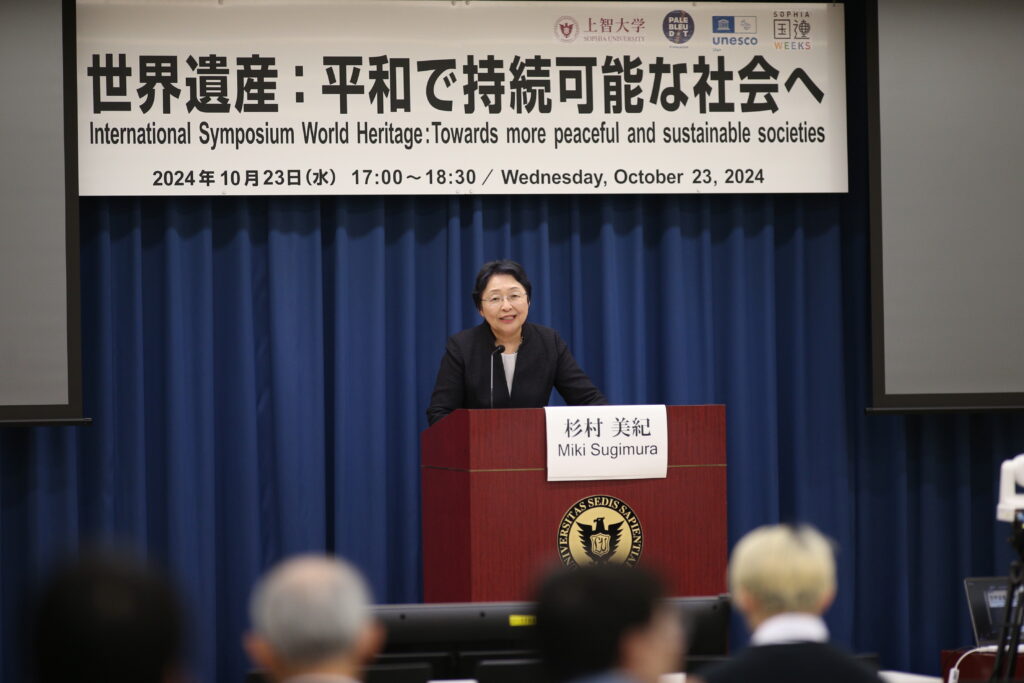
Opening remarks were made in turn by Professor Miki Sugimura of the Department of Education, Faculty of Human Sciences, and Shigeru Aoyagi, President of Pale Bleu Dot Foundation and former Director of UNESCO’s Bangkok Office. Mr. Aoyagi asked the participants to consider the possibility of solving global issues through World Heritage, and then moved on to the following session of keynote speeches.
In the first half of the session, Toshiyuki Kono (Professor Emeritus, Faculty of Law, Kyushu University) and Dr. Etienne Clément (Advisor for Minister of Culture in Cambodia) spoke from their professional perspectives on the relationship between world heritage, peace, and social issues. Mr. Kono spoke about how the Atomic Bomb Dome is a symbol of peace and social issues. Citing the case of the Atomic Bomb Dome being recognized as a World Heritage site, Mr. Kono stated that “the World Heritage system itself can serve as a framework for addressing global issues over the long term through multilateral cooperation. Mr. Clément also emphasized that education is the key to maintaining international consensus on World Heritage.
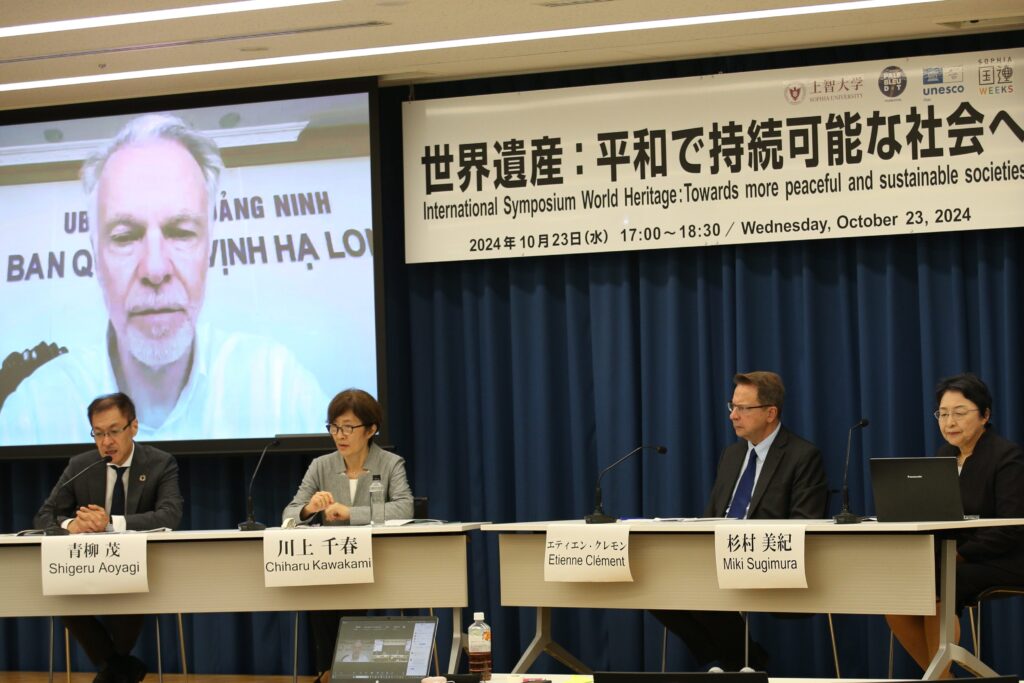
The latter half of the panel discussion was moderated by Aoyagi and included Chiharu Kawakami (Senior Advisor and former Executive Director of the National Federation of UNESCO Associations in Japan), and online by Junko Okahashi (Professor, Faculty of Liberal Arts, University of the Sacred Heart) and Christian Manhart (Advisor for Hanoi City/ Former Director, UNESCO Hanoi Office) also participated. The lively discussion continued until the end of the session, with participants exchanging opinions from various perspectives on “the mutual interest of each country in World Heritage and its connection to a common future” and “the growing importance of World Heritage in local communities.
Innovation in Humanitarian Actions (IHA): why necessary and for whom?
On October 24, a symposium entitled “Innovation in Humanitarian Actions (IHA): why necessary and for whom?” was held jointly with Human Resources Center for International Cooperation, Sophia University.
The event was divided into two parts. The first part, moderated by Professor Yasuhiro Ueki, Director of Human Resources Center for International Cooperation, featured an address by Ms. Kaoru Nemoto, Director of the UN Public Information Center, followed by a special UN Day video message by UN Secretary-General António Guterres. In his message, Secretary-General Guterres expressed his hopes for the presence of young people and his hope that they will gain a proper understanding of and interest in the United Nations.
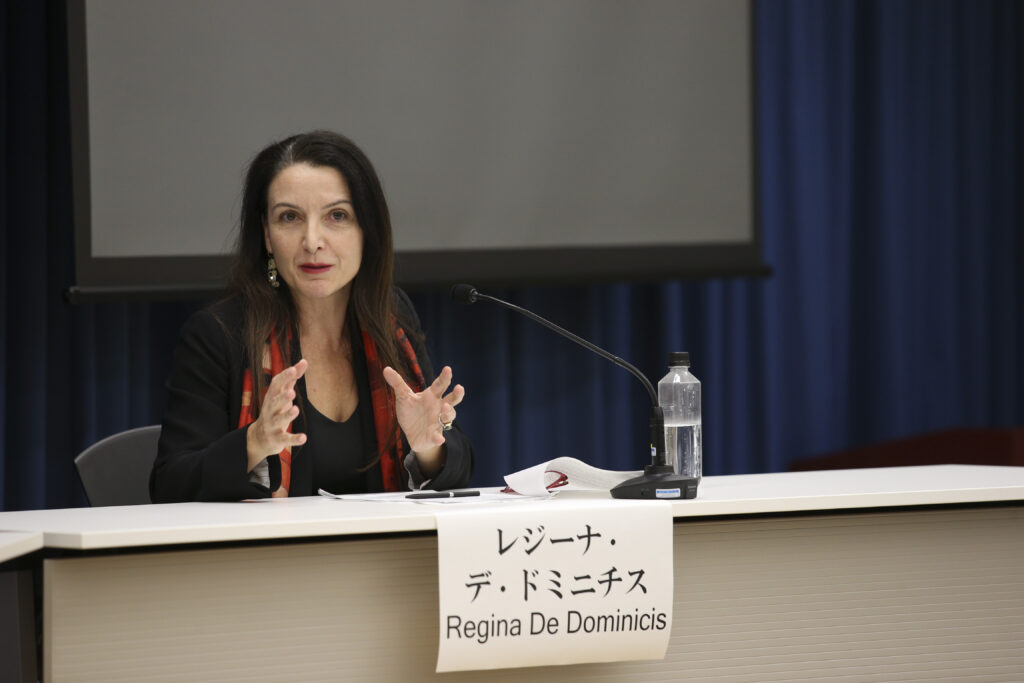
The second part of the symposium, moderated by Professor Taro Komatsu, Faculty of Human Sciences, considered the meaning and role of innovation in humanitarian assistance. The online speakers were TTala Budziszewski from the United Nations High Commissioner for Refugees (UNHCR) and Yukimi Ogaki from the United Nations World Food Program (WFP), while Regina De Dominicis from the United Nations Children’s Fund (UNICEF) spoke in the audience. After introducing the case studies of innovations in the field of humanitarian assistance, a panel discussion was held.
Once the common factors of innovation in humanitarian assistance were identified, Prof. Komatsu then asked the panelists how to scale up innovative approaches, how to utilize technology, and the risks associated with innovation. The three panelists shared their knowledge based on their experiences.
Toward the end of the symposium, the audience and online participants asked a number of questions. Some of the questions were timely, such as about the use of AI and examples of humanitarian aid innovations in the Gaza Strip.
More than 180 participants attended the symposium both on-site and online, indicating a high level of interest in the urgent issue of humanitarian aid. It was a valuable opportunity to discuss many things and share issues and thoughts on the ever-evolving innovation.